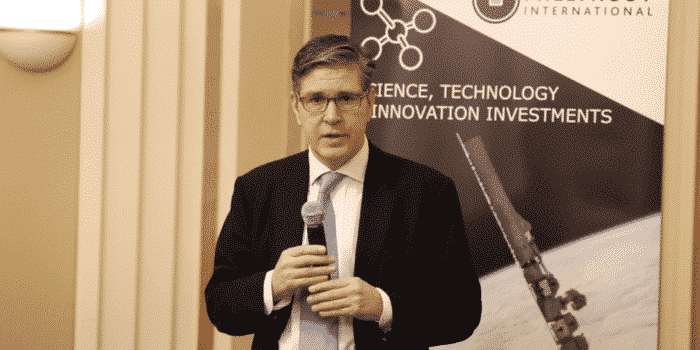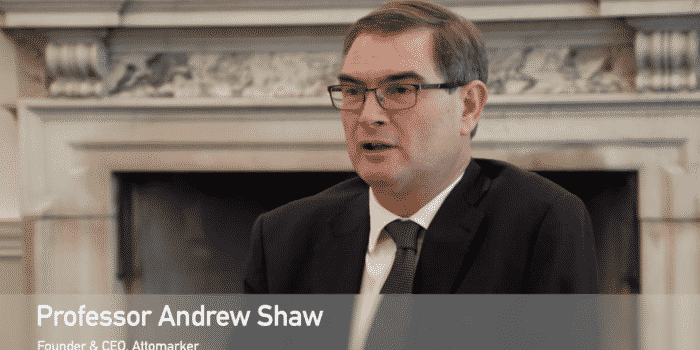We are proud to announce that Milltrust British Innovation Fund investee company PragmatIC has been selected as a finalist in the Technology Company of the Year category of the Cambridge Independent Science and Technology Awards.
Finalists in the 2019 Cambridge Independent Science and Technology Awards revealed
The finalists in this year’s Cambridge Independent Science and Technology Awards have been revealed.
The shortlist represents a showcase of the enormous talent in the Cambridge region across sectors from biotech to cleantech, artificial intelligence to agritech.
There are two categories for individuals as well – Researcher of the Year and CEO of the Year, while new categories in the 2019 awards include the Tech for Good Award, the STEM Initiative of the Year and the Award for Innovation.
A judging panel met on Friday September 6 to pore over a record number of entries.
Coming together at the Cambridge Science Park offices of Grant Thornton, which is again sponsoring the CEO of the Year category this year, the panel featured:
- Chairman Paul Brackley, editor of the Cambridge Independent and editorial director of Iliffe Media;
- Serial entrepreneur Charles Cotton, chairman of the Cambridge Phenomenon;
- Patent attorney and physicist Parminder Lally, of Appleyard Lees;
- Umaima Ahmad, associate transaction director in AstraZeneca’s business development operations team;
- Caroline Hyde, CEO of Allia;
- Nick Sayer, employment partner at Woodfines Solicitors; and
- Hannah Cooke, tax director at Grant Thornton.
Paul said: “I would like to thank the judging panel for their time and expertise on what was a fascinating day of judging.
“We were hugely impressed with the quality and range of entries, which demonstrated, once more, the breadth of talent in this area.”
Finalists will now be invited to the awards ceremony, which takes place at the Bradfield Centre, the £20million deep tech hub on Cambridge Science Park, which offers collaborative workspaces, networking opportunities and support for innovative companies.
The ground floor of the centre will be transformed for the event, where the winners will be announced following a reception sponsored by HSBC.
The finalists
Start-up of the Year, sponsored by Regus
- Arete Medical Technologies
Founded in 2017, Arete is developing the first portable device to measure lung function and inflammation, which could help with the precision and early diagnosis of lung conditions, and lead to a major shift in care through self-management and remote monitoring.
A neural engineering company creating the open standard hardware and software interface between the human nervous system and artificial intelligence. The aim is to enable AI-based healthcare treatments on organs and nerve systems throughout the body, with the first product allowing patients with upper limb loss to control robotic arms with their mind.
This Hauser Forum-based start-up is addressing the von Neumann bottleneck – a limitation in throughput caused by standard computer architecture. Its new memory chip design could make some data operations up to 1,000 times faster and can help with big data and artificial intelligence applications.
- Cambridge Cancer Genomics
The Hills Road company has created a precision artificial intelligence platform to enable oncologists to provide more effective, personalised cancer treatment, by interpreting DNA from a patient and providing genomic insights into individual tumours as they change and grow.
Launched in February 2019, following a decade of world class academic research, this Cambridge Science Park company has developed proprietary direct cellular conversion technology, enabling any mature adult cell to be transformed into any other, without going through a pluripotent stem cell or progenitor cell-state. Led by CEO Darrin Disley, its technology will enable the lifesaving cellular therapies.
Researcher of the Year, sponsored by AstraZeneca
- Dr Stephen Clark, Babraham Institute
Instrumental in developing the single cell multi-omics technologies for which Wolf Reik’s lab is world-leading, Dr Clark has been joint or first-author on all key papers on the invention.
He has acquired computational expertise and driven a large study which, for the first time, applies these techniques to understanding the first cell fate decisions in mammalian embryo development.
- Prof Helena Earl, CRUK Cambridge Centre
Described as the ‘epitome of the clinical researcher’ by CRUK Cambridge Centre director Richard Gilbertson, Prof Earl’s practice-changing results from a landmark clinical trial were published by the Lancet in June, showing women treated with six months of Herceptin for HER2 early-stage breast cancer did as well those on the conventional 12 months. This means fewer side effects and significant healthcare cost savings.
- Dr Benjamin Falcon, MRC Laboratory of Molecular Biology
Described by Brain Prize winner Michel Goedert as central to the work at the LMB that has illuminated the structure of tau filaments in the brain in different types of dementia, Dr Falcon has learnt to perform cryo-electron microcopy to a high standard. The work hasdemonstrated the molecular basis of disease-specific conformers of filaments for the first time.
- Dr Julius Fredens, postdoctoral scientist at the MRC LMB
A lead author on the recent publication in Nature from the lab of Dr Jason Chin, describing how the total genome of E.coli was synthesised from scratch. Four times larger than previous genome synthesis efforts, the design also included the removal of three redundant codons – creating a fundamentally different genetic code to all other organisms in life.
- Dr Arjan Jain, ET-traps Limited
After studying at Cambridge and work in Switzerland, Dr Jain has developed ET-traps, a novel therapeutic that targets and lowers increased endothelin-1 in different diseases. It has been found to reduce markers of diabetes pathology back tonormal levels, and this is proceeding to clinical trials.
- Dr Omer Ziv, Wellcome Trust/ Cancer Research UK Gurdon Institute
Dr Ziv and a team of international collaborators developed a technique to examine the interaction of virus RNA with host cell RNA. Called COMRADES, the technique could enable new anti-viral therapies for humans and animals.
CEO of the Year, sponsored by Grant Thornton
- Sam Bose, Intellisense.io
Having grown up in a mining village, Sam Bose is now disrupting the industrywith AI-powered software that makes predictions on operations that reduce downtime. He has helped to secure a string of contracts, including in Kazakhstan and Chile.
- David Braben, Frontier Developments
Co-creator of the iconic Elite game, David established Frontier in 1994 and has led the studio over 25 years. It went public in 2013, transitioned to a self-publishing model in 2014 and enjoyed its biggest launch to date with Jurassic World Evolution. David is also co-founder of the Raspberry Pi Foundation.
- Loubna Bourfa, OKRA Technologies
Dr Bouarfa founded OKRA in 2016 based on her own AI research and has led it as it established partnerships with global pharma companies. A member of the European Commission’s High-level Expert Group on AI, she advises on ethical, legal and societal issues.
- Chiraz Ennaceur, CorrosionRADAR
Playing a leading role in inspiring more women into engineering and entrepreneurship, Chiraz Ennaceur is helping CorrosionRADAR to target the oil and gas, petrochemical and chemical sectors with its cutting-edge sensor technology.
- Paul Kinnon, PredictImmune
Joining as CEO in early 2018, Paul Kinnon has helped drive PredictImmune’s aggressive commercialisation strategy, including the UK launch of its prognostic test for IBD, and subsequent global launches.
- Prof Gordon Wishart, Check4Cancer Ltd
Prof Wishart founded the early cancer detection company to modernise private screening and diagnostic services. He has helped change the way private cancer diagnostics are delivered.
AI Company of the Year, sponsored by Appleyard Lees
The first AI company focused on finding treatments for rare diseases, Healx focuses on repurposing already approved drugs – a process that is about 80 per cent cheaper and 90 per cent faster than conventional drug discovery. Its most advanced programmes are already in phase 2a clinical trials.
Based at the Bradfield Centre, IPROVA is reinventing invention using AI. Itanalyses vast amounts of data in real-time to make connections between ideas that result in disruptive, commercially relevant inventions – more than 1,000 in a few years in fact.
OKRA’s artificial intelligence-powered platform for life science enables leading pharma companies to combine datasets to generate evidence-based insights to improve medical and commercial outcomes.
Flight delays and cancellations cost the aviation industry up to £47bn a year, but Castle Park-based Satavia says two-thirds could be saved through digitisation and AI capability. Its cloud software technology uses AI to predict and minimise damage to aircraft engines and components caused by ice, dust and pollution.
Biotech Company of the Year, sponsored by Chesterford Research Park
In its 20th anniversary year, Cambridge Science Park-based Astex celebrated the second of its partnered cancer drugs, Balversa, receiving acceleratedmarketing authorisation in the US, following the approval of breast cancer drug Kisqali, in 2017.
A ground-breaking form of cancer immunotherapy, theTMAC platform uses a linker to combine Avacta’s Affimer technology with chemotherapies in a single drug that only become active within the tumour microenvironment. Avacta hopes to test the linker in patients next year.
Focused on using small molecule inhibitors to treat inflammatory and neuroinflammatory diseases caused by inappropriate activation of the immune system, NodThera completed a £28m Series A round last year, and is poised to accelerate multiple compounds through development.
Dedicated to drugging the ‘undruggable’, PhoreMost is focused on identifying new targets using its SITESEEKER platform, based on its proprietary protein interference, or PROTEINi, technology. This year, it has announced collaborations in oncology and neurodegeneration.
Built on the exciting RNA epigenetics work of Prof Tony Kouzarides and Eric Miska, STORM has raised £30m in Series A funding. It is leading the way in tackling disease through modulating RNA-modifying enzymes.
Medtech Company of the Year
Its proprietary technology aims to reduce diagnostic tests for diseases including cancer to a blood draw, using the 5hmC epigenetic modification as a powerful biomarker. The initial focus is on colorectal cancer.
With its leading clinical decision support platform, Congenica beat global competitors to win a multi-year contract with Genomics England as the exclusive interpretation partner for the NHS Genomic Medicine Service, and bolstered its Series B funding round in April by £13.25m to a total of £23.3m.
Helping women with breast cancer to avoid surgery when it isn’t needed, or experience better outcomes when it is, Endomag’s Magseed marker is a tiny magnetic seed inserted before surgery to guide surgeons, while its liquid tracer Magtrace follows the route cancer cells are likely to take. Both are detected by the Sentimag probe.
The Babraham-based firm has just closed a £10m funding round to support the launch of its prognostic test for inflammatory bowel disease, which is based on a blood-based biomarker that predicts long-term outcomes for patients, guiding treatment.
Cleantech Company of the Year, sponsored by Woodfines Solicitors
A University of Cambridge spin-out, Camnexus bridges the digital divide in developing and developed countries by supplying low-power sensor technologies for real-time environmental and operational monitoring, with its early focus on Brazil, where two Internet of Things networks have been installed, helping to monitor a hydroponic farming greenhouse.
We waste a third of the produce we grow. COGZ aims to prevent food waste at the start of the chain using a platform that enables farmers to sell their surplus and imperfect produce directly to food and drink manufacturers.
The annual global cost of corrosion is put at more than £2trillion. CorrosionRADAR transforms corrosion management through sensors, IoT technology and predictive analytics to help the oil and gas, petrochemical and chemical industries, reducing the risk of environmental hazards and cutting CO2 footprints.
With a mission to accelerate electric vehicle adoption, Spark’s innovative system uses live data, such as road conditions, and machine learning to deliver personalised journey predictions that are 10 times more accurate than manufacturer systems, helping drivers overcome ‘range anxiety’.
Agritech Company of the Year, sponsored by SmithsonHill
We waste a third of the produce we grow. COGZ aims to prevent food waste at the start of the chain using a platform that enables farmers to sell their surplus and imperfect produce directly to food and drink manufacturers.
Its tags are placed around the neck of livestock, sending details of heart rate, temperature, location, movement, muscle mass and activities to the farmer’s phone, along with weight predictions. It has recently signed a deal with Samsung, and will also be launching its own UK beef brand.
Providing an agricultural supply chain intelligence system that connects farmersand food businesses, KisanHub has recently been working with Budweiser brewer AB InBev to help barley growers in India, and announced a £3.4million Series A funding round.
A real-time calf-monitoring solution uses AI and Internet of Things technology records vital signs and enables disease detection, helping to enable more sustainable and profitable farming. Smartbell has won more than £1m in Innovate UK grants and has secured a commercial pilot with a large UK beef producer.
Games Company of the Year
In its fifth successive year of growth, Jagex has seen its Runescape and Old School Runescape games achieve their best performance, with the latter bolstered by a triumphant mobile launch – achieving eight million installs and winning EE Mobile Game of the Year at the 2019 BAFTA Games Awards.
Recognised as one of the best places to work in the UK games industry, Frontier is the UK’s largest independent studio and grew revenue by more than 160 per cent and operating profit by more than 500 per cent in the year to May 31, 2019, powered by Jurassic World Evolution.
Technology Company of the Year, sponsored by the Anglia Ruskin University Faculty of Science and Engineering
The Cambridge Science Park company provided the technology for HTC to launch its Vive Wireless adapter, which enables users of HTC’s virtual reality headsets to have freedom of movement by removing the cable connecting them to the computer.
Using the real-time machine learning ARIC platform to detect fraud and protect consumers, Featurespace now works with 19 of the major global banks, including four of the UK’s biggest five, as well as payment providers, insurance companies and gambling firms.
The independent supplier of electronics, software, tools and services for industrial inkjet systems has achieved spectacular growth through exports, won a Queen’s Award for Enterprise and introduced new NozzleFix technology to reduce the textile industry’s environmental impact.
Extending the Internet of Things to the Internet of Everything, its ultra low-cost flexible integrated circuits are thinner than a human hair and can be embedded into everyday objects. It received orders for more than 20 million units within two months of announcing is first products.
Life Science Company of the Year, sponsored by BioStrata
Having celebrated its 20th anniversary, the life science research tools provider brought its Cambridge staff under one roof at a new HQ on the Biomedical Campus. It has also maintained double digit growth and, in January, acquired California-based Calico Biolabs.
With its leading clinical decision support platform, Congenica beat global competitors to win a multi-year contract with Genomics England as the exclusive interpretation partner for the NHS Genomic Medicine Service, and bolstered its Series B funding round in April by £13.25m to a total of £23.3m.
Its Breath Biopsy platform has the potential to revolutionise the early detection of cancer and other diseases. Trials are under way with the NHS and Cancer Research UK, while the company’s focus on precision medicine has led to partnerships with major pharma and academic institutions.
Dedicated to drugging the ‘undruggable’, PhoreMost is focused on identifying new targets using its SITESEEKER platform, based on its proprietary protein interference, or PROTEINi, technology. This year, it has announced collaborations in oncology and neurodegeneration.
The One to Watch, sponsored by Cofinitive
This Hauser Forum-based start-up is addressing the von Neumann bottleneck – a limitation in throughput caused by standard computer architecture. Its new memory chip design could make some data operations up to 1,000 times faster and can help with big data and artificial intelligence applications.
Covering from mine to market, its real-time decision-making platform and artificial intelligence-powered applications takes in sensor data and applies algorithms to enable mining corporations to improve productivity, save energy and reduce water usage.
Launched in February 2019, following a decade of world class academic research, this Cambridge Science Park company has developed proprietary direct cellular conversion technology, enabling any mature adult cell to be transformed into any other, without going through a pluripotent stem cell or progenitor cell-state. Led by CEO Darrin Disley, its technology will enable the lifesaving cellular therapies.
A cancer liquid biopsy, Mursla is developing a platform using quantum biology, nanotechnology and bioengineering to detect up to 100 different types of cancer with a single blood test.
It has created a novel biomarker panel that could be deployed in an ambulance as a blood test for suspected stroke patients, to help those at most danger jump the queue and go straight to a comprehensive stroke centre.
A University of Cambridge spin-out, its sensor technology could be used to measure air quality or vehicle emissions. Used in a fridge, it could cut down food waste by giving an early-warning system. In a mobile phone, it could help detect cold and flu viruses.
The Award for Innovation, sponsored by Cambridge Precision Ltd
Its Humabody therapeutics are small, multispecific molecules that can be configured to engage therapeutic targets in ways that conventional antibodies cannot achieve. January brought the extension of its oncology collaboration with Takeda, which took a second licence for an oncology target in July.
The Chesterford Research Park company is developing a desktop DNA synthesis platform that will generate high fidelity DNA at scale for the rapid prototyping of biological designs. It offers the potential to synthesise and assemble whole metabolic pathways on a chip.
The Cambourne Business Park company’s ScreenPro software controls ink placement from inkjet heads to improve print quality. Uniquely, it can be used in any inkjet press workflow irrespective of other software choices.
An innovator in the evolving field of microbiome-based therapeutics and biomarkers, it is progressing therapeutic programs for live bacterial products in inflammatory bowel disease, immuno-oncology and C.difficile.
Using cocrysal technology to unlock the therapeutic potential of approved small molecule drugs, Nuformix is targeting high value unmet needs, including treatment for chemotherapy-induced nausea and vomiting.
The pre-clinical drug discovery company is focused on small molecules that target damaged mitochondria, which have been shown to decelerate biological ageing in mice. It is also developing a platform for the discovery of new ageing biology and drug targets.
The Tech for Good Award, sponsored by Allia Future Business Centre
A University of Cambridge spin-out, Camnexus bridges the digital divide in developing and developed countries by supplying low-power sensor technologies for real-time environmental and operational monitoring, with its early focus on Brazil, where two Internet of Things networks have been installed, helping to monitor a hydroponic farming greenhouse.
Providing assistive technology and related services to disabled people in the workplace and education, Dyslexia Box sells speech recognition software, dyslexia screeners and the OrCam – a device that can read text on screens, road signs, and retail products.
With most science publishing today remaining slow and expensive, and new research locked behind paywalls, the non-profit wants to drive broad reform in science communication with its open-source tools and Libero publishing system.
Helping those with hearing loss to use mobile phones more effectively, Goshawk has created a personalised ‘hearing aid in the sky’ solution applied over the mobile phone network. It uses algorithms to measure frequency loss and an audio process to enhance those reduced frequencies.
A University of Cambridge spin-out, its sensor technology could be used to measure air quality or vehicle emissions. Used in a fridge, it could cut down food waste by giving an early-warning system. In a mobile phone, it could help detect cold and flu viruses.
STEM Initiative of the Year, sponsored by MathWorks
- The AstraZeneca Energy Challenge
A competition for primary school children, designed to inspire the next generation to engage with STEM subjects and careers, the challenge tasked Year 5-6 pupils – 4,000 of whom took part – to recognise the energy densities of foods, important in making healthy food choices.
- Cambridge Science Festival
Celebrating its 25th anniversary in 2019, the festival comprised 375 events – from talks, hands-on activities, workshops and more – which led to 65,000 interactions with the public and involved more than 1,000 scientists and technologists.
An online platform offering cybersecurity expertise on demand, Padlock’s aim is to address the gender imbalance in this male-dominated industry by offering free interactive and market-focused training for single parents.
Providing a future-focused education, St Faith’s has a strong focus on computing, with its head of computing supporting more than 25 schools. It is the only prep school to teach engineering. Its Year 5s explore wind turbines, Year 6 studies flight and Year 7 builds rockets, while Year 8 holds a STEM fair.
Its girls enjoy STEM afternoons from Year 4, led by a dedicated STEM co-ordinator. St Mary’s entered the International RoboCup, finishing eighth in Europe, while Junior School coders enjoyed RoboCup Junior national success, and outreach work includes hosting practical lessons from state schools.
Managed by Form the Future, this STEM programme gives students hands-on experience on project days hosted by industry partners at their workplaces. Featuring 29 schools and 26 STEM companies, it has reached 6,370 students.




